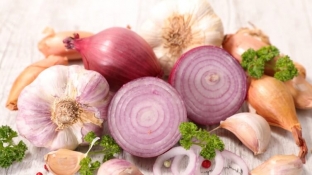For each of us, it is literally an axiom: in order for food not to spoil, they should be placed in the refrigerator. At the same time, we are guided by the fact that bacteria found in products (or on them) at low temperatures become less active, which means that the process of organic decay proceeds more slowly, while storage periods, on the contrary, increase. All this is true, but at the same time not entirely true. It's just that some products change their properties at low temperatures and therefore storage in cold conditions is contraindicated for them.
They don't belong there: foods that don't need to be refrigerated
Products that should not be in the refrigerator, we eat every day. But we don’t even realize that we store them incorrectly.
Some products are not strictly forbidden to stay in the cold, but not at all. You just need to know how to save them properly.
Tomatoes
This vegetable in the cold quickly loses both aroma and taste. The fact is that in a frosty environment, the process of destruction of useful compounds contained in tomatoes, including those responsible for taste, begins. But the texture of the vegetable also does not avoid negative changes: the membranes in the walls of tomatoes are destroyed, which makes the fruits mealy. Therefore, the best storage place for these fruits – at room temperature, but away from the sun.
Avocado
There are certain nuances with the storage of this fruit. If you put it in the refrigerator unripe, you will almost freeze it, as it ripens outdoors. And if you have purchased an already ripened fruit, but do not want to eat right away, then it should be sent to the cold.
Potatoes
Regularly placing potatoes in the refrigerator is a serious mistake. Please note that in such conditions the vegetable becomes crumbly and sweet. The latter happens because starch is converted to sugar. The optimal storage place for the product, which is commonly called the second bread, is cardboard boxes (plastic and paper bags in this case are bad because they do not allow air to pass through), placed in a dry, not frosty, but cool, dark place with good ventilation.
Bow
Onions in the fridge – a bad idea because the vegetable is very susceptible to poor air circulation as well as humidity. In particular, because of the latter, it quickly softens and deteriorates, it can even become moldy. Best bow "feels" himself in a dry and dark place, because when exposed to light, his taste changes and, of course, not for the better. Also, do not put the onions together with the potatoes, otherwise both one and the other vegetable will quickly rot.

Garlic
The same applies to this product: in the destructive moisture of the refrigerator, it will not last even a month – it will sprout or become moldy, and it will taste "rubber", while in a dry and cool place it will be very comfortable. By the way, the option of storing garlic along with onions is quite acceptable.
Bananas
Out of the refrigerator, these tropical fruits retain their nutrients best, and in it – stop ripening due to darkness, begin to rot due to moisture, and, of course, lose their taste. Store bananas at room temperature and hanging up to prevent bedsores.
Citrus
These fruits are best kept at room temperature, since cold air is also not good for them: most of their taste disappears in the refrigerator, and, in fact, those properties for which we value them so much. But fruits placed, for example, on a kitchen table on a dish, should not touch each other, otherwise they can quickly become moldy.
When stored in the refrigerator, many products that are practically daily guests on our table destroy their texture, they lose their aroma, taste, and even often color – all the best we expect from food.
We often think that the ideal way to preserve the quality of food – put it in the refrigerator. We have given a list of the most common foods that do not need to be stored in the refrigerator, since this rule is not constructive in relation to them. It is worth noting that the following are also not subject to cold storage: olive oil, honey, basil, coffee, bread.






Add a comment